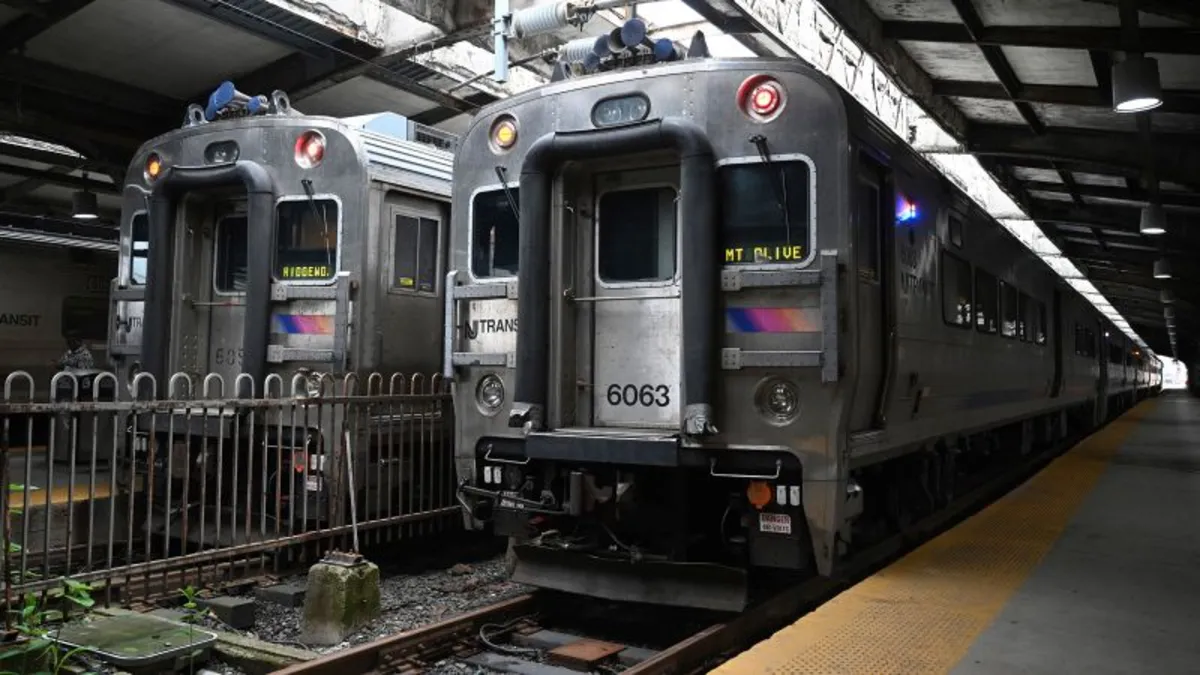
Engineers at New Jersey Transit initiated a strike early Friday morning, effectively bringing operations to a standstill for the nation’s third-largest commuter rail service. This disruption follows a final day of negotiations between the state-run commuter rail service and the Brotherhood of Locomotive Engineers and Trainmen (BLET), which ultimately failed to yield a last-minute agreement to avert the strike.
The work stoppage is set to significantly inconvenience approximately 100,000 daily rail commuters, local businesses across the New York metropolitan area, and concertgoers attending performances by music icons Shakira and Beyoncé at a football stadium just outside of Manhattan in the upcoming days.
Negotiations concluded shortly before 10 p.m. ET on Thursday, as reported by both the union and NJ Transit CEO Kris Kolluri, who addressed the media alongside New Jersey Governor Phil Murphy at a press conference late Thursday night. Kolluri expressed that the two parties were close to finalizing a deal, but could not agree on a wages package that NJ Transit management deemed affordable.
Kolluri stated that both sides are scheduled to reconvene for negotiations by Sunday morning, and he is prepared to negotiate sooner if the union is receptive. Both Kolluri and Murphy emphasized their desire to reach a fair agreement for union members, while also ensuring that such demands do not jeopardize the financial health of NJ Transit.
Previously, a tentative labor deal was rejected by a staggering 87% of the nearly 500 union members responsible for operating the trains. Although this deal would have granted workers their first raise since 2019 and provided substantial backpay, it still left them significantly behind their counterparts at Amtrak and nearby commuter railroads.
BLET National President Mark Wallace criticized NJ Transit’s spending priorities, pointing out that the agency allocated a half-billion dollars for a new headquarters and $53 million for its interior decoration while offering limited support to its frontline workers. “They have funds for penthouse views and pet projects, just not for their front-line workers. Enough is enough,” Wallace declared, asserting that the strike would continue until members receive the compensation they deserve.
To mitigate the fallout from the strike, NJ Transit officials have increased bus service, although they acknowledged that buses would only accommodate an “extremely limited number” of commuters. The agency, along with Governor Murphy, urged rail users to explore alternative plans or to work from home if feasible. “If you can work from home, tomorrow (Friday) would be a really good day to do so,” Murphy advised, highlighting the engineers’ crucial role in the state’s transit system.
The strike is expected to exacerbate traffic congestion across the bridges and tunnels connecting New Jersey to Manhattan, compounding the challenges for commuters who may encounter a congestion pricing toll of up to $9, in addition to the already hefty bridge and tunnel tolls. This situation is particularly concerning for concertgoers heading to performances by Shakira and Beyoncé, with both events taking place at MetLife Stadium in New Jersey.
With Shakira scheduled to perform on Friday night, NJ Transit had already canceled special services to the concert, fearing that fans could be left stranded once the strike commenced. Those driving to the shows are likely to face heavier-than-normal traffic as train passengers are forced onto the roads.
The union maintains that its members require a significant wage increase to align their salaries with those of engineers at other passenger railroads, emphasizing that they will not accept anything less. “We, the locomotive engineers of NJ Transit, are asking only for a fair and competitive wage,” stated Thomas Haas, the general chairman of the union’s unit representing the engineers, prior to the NJ Transit board meeting.
Despite the union's stance, NJ Transit argues that meeting their demands would require extending similar pay raises to other unions under “me too” clauses in their labor agreements, raising additional financial burdens. According to Governor Murphy, these clauses could escalate costs from less than $10 million a year to over $100 million annually, which NJ Transit claims it cannot sustain.
Both sides remain hopeful for a swift resolution to the strike. Kolluri expressed optimism that an agreement is still within reach, stating, “This is not a lost cause. This is an imminently achievable deal.” The union has indicated that the previously rejected contract would have left its members approximately 20% behind their counterparts at Amtrak and other nearby commuter railroads, contributing to a membership decline from 500 to 450 as engineers leave for better opportunities.
Replacing departing engineers is costly; it requires two years of training at an expense of $250,000 each, while NJ Transit faces potential service cancellations due to staff shortages. However, NJ Transit insists that it has enough personnel to maintain its full service schedule.
Railroads operate under the Railway Labor Act, a federal law that restricts labor relations at railroads and airlines, thereby limiting unions’ ability to strike. In instances where unions reject contracts, Congress can compel them to remain on the job and accept the terms. This occurred in December 2022 when Congress intervened to prevent a strike involving major freight railroads.
However, it remains to be seen if Congress will take similar action in this case involving a single commuter railroad. Historically, commuter rail strikes have extended for weeks or even months without Congressional intervention, and as of now, no legislation has been proposed to block or conclude the strike. Past strikes have seen durations ranging from weeks to months, highlighting the potential for a prolonged disruption.
This story will be updated as new information becomes available.